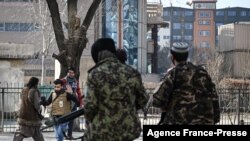The Taliban have arrested two journalists working for a local news channel in Afghanistan, which has seen an increase in assaults on dissent since the Islamist group seized power last August.
The arrests come days after two women activists went missing in the capital, Kabul, amid accusations they are being held by the Taliban.
Local press freedom advocates alleged Ariana TV reporters Waris Hasrat and Aslam Hijab were picked up by Taliban forces on Monday afternoon while they were leaving office for lunch in the capital.
“The reason for the arrest of these reporters is not yet clear,” Free Speech Hub, an independent Afghan group working for press freedom, said in a statement.
The United Nations Assistance Mission in Afghanistan (UNAMA) demanded Tuesday the Taliban address the journalists’ detention and make clear the whereabouts of the missing women activists.
“Mounting concern about restrictions on media & free expression. UN urges Taliban to make public why they detained these @ArianaNews_ reporters & to respect Afghan's rights,” UNAMA said on Twitter.
Taliban officials have not yet commented on the incident. Ariana TV officials said the Taliban “have assured us of comprehensive investigation.”
Amnesty International demanded Tuesday the Islamist rulers “unconditionally and immediately” release the two journalists.
“The arbitrary arrest of two Ariana News journalists by the Taliban is unjustifiable. Such escalating attacks on media freedom are a grave threat to the right to freedom of expression,” Amnesty wrote on Twitter. “The Int’l community must call on the Taliban to end human rights violations & hold them accountable,” said the global rights defender.
The female activists went missing two weeks ago after taking part in a protest rally in Kabul calling for women’s rights and denouncing the Taliban’s directive for women to wear hijabs.
Taliban authorities have denied knowledge of the women’s whereabouts, saying an investigation is underway into the incident.
The Islamist group has cracked down on human rights activists, forcefully dispersed protests against their regime and subjected several journalists to torture for covering demonstrations not approved by authorities.
Last week, the Taliban blocked an Afghan media advocacy group from holding a press conference in Kabul, drawing international condemnation.
The United States and other countries have not yet recognized the Taliban as the de facto government of Afghanistan.
The international community has been pressing the Islamist group to deliver on pledges that it would respect human rights, especially those of women, and govern the country through a broad-based government.
But critics say the Taliban have reneged on their commitments and they are slowly reintroducing restrictions they had placed on women during the hardline group’s previous regime in Kabul from 1996 to 2001.
The alleged human rights violations have discouraged foreign governments from directly engaging with the Taliban, restoring financial aid to Afghanistan, removing international sanctions and unblocking billions of dollars in Afghan national assets held at the U.S. Federal Reserve.
These financial restrictions have plunged the Afghan economy into an unprecedented turmoil, worsening an already dire humanitarian crisis in the war-torn country.
The United Nations said in a report last week that it had received “credible allegations” that more than 100 members of the former Afghan government have been killed since the Taliban took over the country.
The report quoted U.N. Secretary-General Antonio Guterres as saying that that “more than two-thirds" of the victims were alleged to result from extrajudicial killings by the Taliban or its affiliates, despite the Taliban's announcement of “general amnesties” for those affiliated with the former government and U.S.-led coalition forces.
The Taliban rejected the report. “After a general amnesty, no one is allowed to harm anyone,” Taliban spokesman Zabihullah Mujahid claimed. If any of the alleged killings were a result of personal revenge, they will investigate and punish the perpetrators, Mujahid added.
Some information for this story came from the Agence France-Presse.
